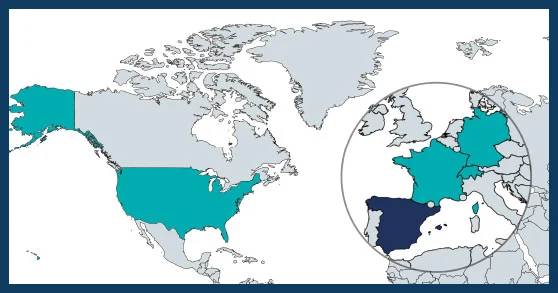01-2019 to 03-2022
€ 967,046
Montserrat Vilà
montse.vila@ebd.csic.es
Belinda Gallardo
belinda@ipe.csic.es
Estación Biológica de Doñana, CSIC, Seville, SPAIN
Instituto Pirenaico de Ecología, CSIC, Zaragoza, SPAIN
University of Fribourg, SWITZERLAND
Laboratoire d’Ecologie Alpine, Université Grenoble Alpes, FRANCE
Institute of Biology, Freie Universität Berlin, GERMANY
University of Massachusetts, Amherst, USA
University of California, Irvine, USA

Invasive Alien Species (IAS) are a direct driver of biodiversity loss and have major impacts on supporting, provisioning, regulating and cultural services. Both the numbers and distributions of IAS are increasing in many parts of the world. This is fostered by international trade and travel, with multimillion costs arising from economic loss in the agriculture, forestry, energy and health sectors, and cost of controlling and eradicating invasions. Climate change introduces an additional challenge for IAS management because species’ ranges are shifting in response to warming. Researchers and managers are under growing pressure to evaluate the costs and benefits of plausible intervention scenarios to control invasions and maintain ecosystem services. However, past research has mainly focused on the ecological factors determining the success of IAS and changes in biodiversity after invasion, treating ecosystem services only marginally. To support policy and management, there is an urgent need to synthesise knowledge across habitats and scales, thereby providing a comprehensive understanding of the multi-faceted impacts of IAS.
Using data derived from surveys and experiments and models across habitats (terrestrial, freshwater and marine) and scales (continental and local), InvasiBES aims to better understand and anticipate the impacts of IAS on biodiversity and ecosystem services and to provide tools for their management.
InvasiBES will design three future intervention scenarios focused on prevention, control and eradication of IAS in Europe and the US, through a participatory pro- cess bringing together the expertise of scientists and stakeholders. We will also adapt current impact assessment protocols (EICAT and SEICAT) to consider both the detrimental and beneficial impacts of IAS on biodiversity and ecosystem services. This information will be combined with maps of the potential distribution of some of the worst IAS in Europe and the US under current and future climate change scenarios. Models and maps will serve to evaluate the costs and benefits in terms of ecosystem services of alternative IAS intervention scenarios. Moreover, focusing on three local scale studies that cover a range of habitats (freshwater, terrestrial and marine), invasive species (plants and animals) and ecosystem services (supporting, provisioning, regulating and cultural), we will quantify the impacts of IAS and explore the recovery of ecosystems after the invader is removed. Spatial planning tools (InVEST) will be used to evaluate the costs and benefits of intervention scenarios at the local scale.
The results of InvasiBES are of high interest for policy stakeholders and practitioners who aim to invest IAS management resources efficiently and solve potential conflicts using science-based analyses of costs and benefits for ecosystems and society. Because InvasiBES will prioritise IAS listed under EU regulation for analysis, European and member state policy-makers and practitioners will be especially interested in the project and invited to engage from the beginning. In the US, we will collaborate with the Northeast Regional Invasive Species and Climate Change (RISCC) Management Network to support the regulatory listing of high-priority species identified in this project.